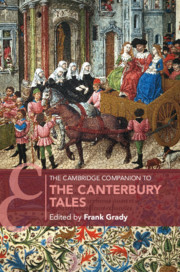Book contents
- The Cambridge Companion to The Canterbury Tales
- The Cambridge Companion to The Canterbury Tales
- Copyright page
- Contents
- Illustrations
- Contributors
- Preface
- Note on the Text
- Chronology
- Abbreviations
- 1 The Form of the Canterbury Tales
- 2 Manuscripts, Scribes, Circulation
- 3 The General Prologue
- 4 The Knight’s Tale and the Estrangements of Form
- 5 The Miller’s Tale and the Art of Solaas
- 6 The Man of Law’s Tale
- 7 The Wife of Bath’s Prologue and Tale
- 8 The Friar’s Tale and TheSummoner’s Tale in Word and Deed
- 9 Griselda and the Problem of the Human in The Clerk’s Tale
- 10 The Franklin’s Symptomatic Sursanure
- 11 The Pardoner and His Tale
- 12 The Prioress’s Tale
- 13 The Nun’s Priest’s Tale
- 14 Moral Chaucer
- 15 Chaucer’s Sense of an Ending
- 16 Postscript: How to Talk about Chaucer with Your Friends and Colleagues
- Further Reading
- Index
- Cambridge Companions to …
3 - The General Prologue
Published online by Cambridge University Press: 21 August 2020
- The Cambridge Companion to The Canterbury Tales
- The Cambridge Companion to The Canterbury Tales
- Copyright page
- Contents
- Illustrations
- Contributors
- Preface
- Note on the Text
- Chronology
- Abbreviations
- 1 The Form of the Canterbury Tales
- 2 Manuscripts, Scribes, Circulation
- 3 The General Prologue
- 4 The Knight’s Tale and the Estrangements of Form
- 5 The Miller’s Tale and the Art of Solaas
- 6 The Man of Law’s Tale
- 7 The Wife of Bath’s Prologue and Tale
- 8 The Friar’s Tale and TheSummoner’s Tale in Word and Deed
- 9 Griselda and the Problem of the Human in The Clerk’s Tale
- 10 The Franklin’s Symptomatic Sursanure
- 11 The Pardoner and His Tale
- 12 The Prioress’s Tale
- 13 The Nun’s Priest’s Tale
- 14 Moral Chaucer
- 15 Chaucer’s Sense of an Ending
- 16 Postscript: How to Talk about Chaucer with Your Friends and Colleagues
- Further Reading
- Index
- Cambridge Companions to …
Summary
For generations the conventional “roadside drama” reading of the General Prologue, despite or even because of its undeniable explanatory efficiency, has made it difficult for critics trying to view the Prologue as an object of analysis to view the whole of it. In its construction, Chaucer teases readers with the expectations evoked by the conventional genres of the dream-vision and the estates satire, dangling their promises but leaving them unfulfilled, and uses their features while rejecting their premises and withholding the normal modes of their action. Ultimately what is most distinct about the achievement of the General Prologue is how successfully it seems to ward off grasp of its artifice, organizing the experience of reading to make it seem an experience of something prior to reading.
- Type
- Chapter
- Information
- The Cambridge Companion to The Canterbury Tales , pp. 45 - 58Publisher: Cambridge University PressPrint publication year: 2020

